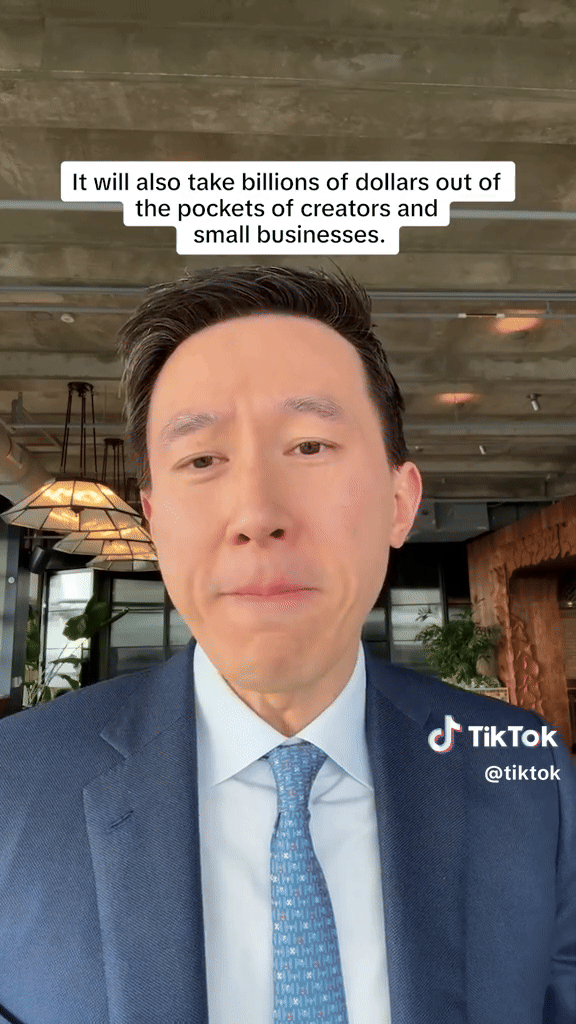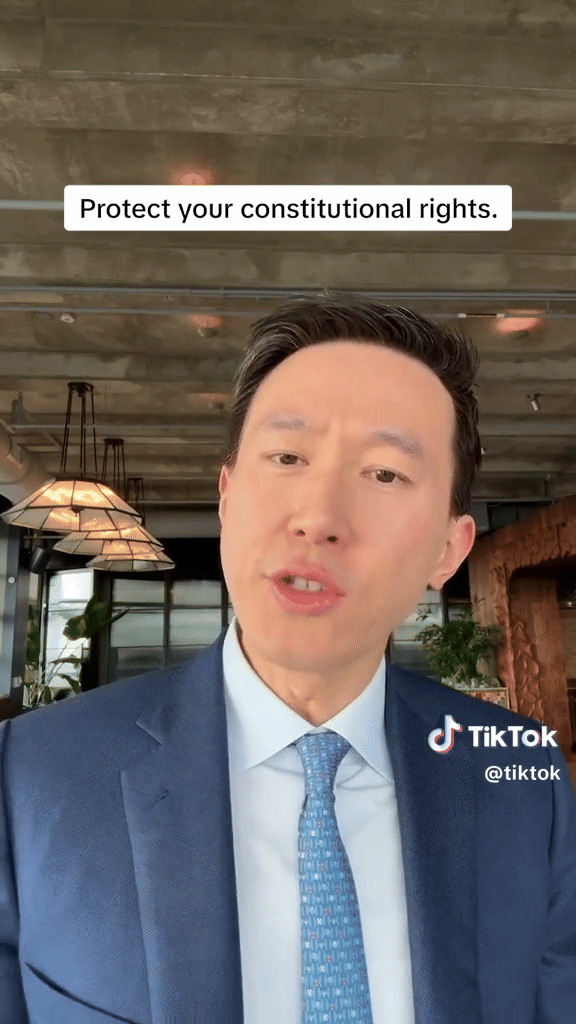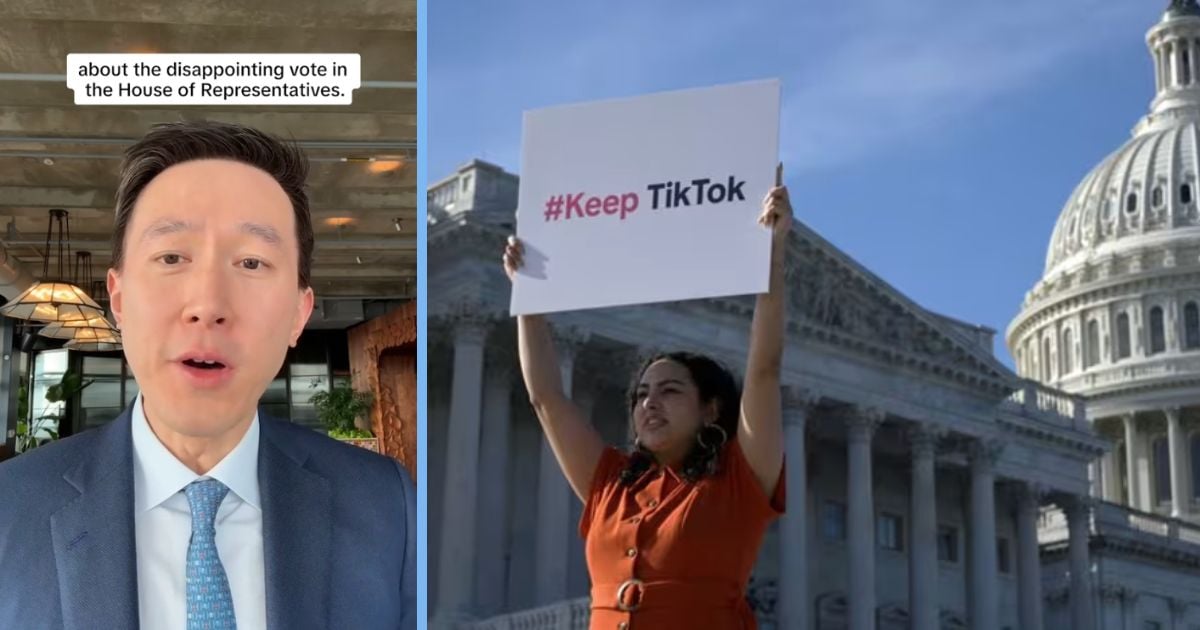Advertisements
We all laughed incredulously at the Congress session that took place on 31 January 2024 when the CEO of TikTok, Chew Shou Zi was relentlessly grilled by US Senators with rather out-of-left-field accusations.
These accusations include TikTok being under the a “Beijing communist-based parent company”, TikTok promoting harmful behaviour, and more absurdly, speculations about if Singaporean Mr Chou has ever been “a member of the Chinese Communist Party”.
(Let’s be real, you read that last part with the accent, didn’t you?)
Who would have thought that months later, it would give rise to a more serious issue, dare I say, the nightmare of Gen Z and Alpha children everywhere – TikTok could very well be banned from the United States.
Known as the Protecting Americans from Foreign Adversary Controlled Applications Act, the bill was passed in a vote of 352 to 65.
Lawmakers in Washington are moving forward with a bill that could lead to a nationwide ban on the popular social media platform.
Here’s everything you need to know.
What is on the US Bill?
Before we talk about the bill, it is important to know that TikTok’s owner is the China-based company known as ByteDance (you know, the aforementioned “communist-based company”).
ByteDance has also produced the Chinese social media platform Douyin (or what you may know as Chinese TikTok).
On Wednesday, 13 March 2024, the US House of Representatives passed a bill stipulating that Bytedance must sell its stakes in TikTok within six months.
Essentially, the legislation offers two choices to ByteDance: sell TikTok, or be banned.
Advertisements
If ByteDance opts for divestment, TikTok can continue to operate in the US if the President deems it no longer under foreign control.
The bill also mandates ByteDance relinquish control of TikTok’s renowned algorithm.
Failure to adhere to these terms would mean that TikTok would be subsequently barred from mobile application stores and web-hosting services until divestment occurs.
Experts have weighed in stating that it would be difficult for ByteDance to sell TikTok in a few months.
As of now, it is not known if other non-ByteDance China-owned platforms like WeChat will be affected by this bill.
What Comes After Passing the Bill?
Fortunately, there is still some hope for the content creators who make a living off the social media platform.
Though the bill has already been passed by the US House of Representatives, for TikTok to be fully shut down in the US, the Senate will also need to pass the measure for it to become a law.
As such, all eyes, including that of the 170 million American TikTok users, turned to the Senate as they waited with bated breath for them to take action.
Senate Majority Leader Chuck Schumer stated that the Senate will assess the legislation thoroughly, but it is predicted that the Senate is unlikely to take action soon, maybe even up till a few months.
This measure is part of Washington’s response to US national security apprehensions regarding China, spanning from connected vehicles to AI chips and cranes at US ports.
Advertisements
In the meantime, President Joe Biden has stated that he would sign the bill into law, should it pass the Senate successfully.
Why Do Lawmakers Dislike TikTok?
As mentioned before, TikTok has been facing a slew of accusations and mistrust from lawmakers from both US parties.
The apprehension stems from Chinese national security laws mandating organizations to aid in intelligence gathering, potentially subjecting ByteDance to such demands.
White House national security adviser Jake Sullivan on Tuesday asked, “Do we want TikTok, as a platform, to be owned by an American company or owned by China? Do we want the data from TikTok – children’s data, adults’ data – to be going, to be staying here in America or going to China?”
Despite those accusations, TikTok denies being a tool of the Chinese government, stating it hasn’t shared US user data and will not do so even if requested. The US government has yet to present any evidence of TikTok sharing such information.
Beyond security, concerns still include allegations of any and all content unfavorable to Beijing being suppressed by the app, which TikTok refutes.
Advertisements
The Office of the Director of National Intelligence even highlighted in a recent report that the Chinese government has leveraged TikTok to influence US elections, targeting candidates from both political parties during the 2022 midterm cycle.
CEO Chew Shou Zi Speaks Out
Mr Chew said in a video posted on Thursday morning that if the legislation is signed, it will “give more power to a handful of other social media companies” and “take billions of dollars out of the pockets of creators and small businesses. It will put 300,000 American jobs at risk”.


In the video uploaded on TikTok’s official account, he said that the vote was “disappointing”.
(Huh, just like what my mother calls me…)
Mr Chew reiterated that TikTok has invested to keep the data of US users safe, as well as free from “outside manipulation”.
Advertisements
“We have committed, and we will continue to do so,” he said.
He stated that the company would not stop advocating for its users as well as exercise its legal recourse to oppose a ban.
Once signed by President Joe Biden, the bill provides the company with 165 days to initiate a legal challenge.
Mr Chew concluded his video by encouraging their US users to keep sharing their stories with their friends, families and even Senators.
“Protect your constitutional rights, make your voices heard,” he said.


TikTok has also sent notifications to select users, urging them to contact their representatives regarding the legislation, framing it as a “TikTok shutdown”.
The company warned of a “total ban” that could adversely impact businesses, creators, and artists nationwide. In response, many users flooded congressional offices with calls on Thursday, prompting some offices to temporarily disable their phone lines.
TikTok even flew numerous influencers to Washington to engage in a lobbying effort against the bill.
Advertisements
Despite the “tut-tut”s from the people at the US House of Representatives, it is undeniable that TikTok has led to the improvement of the lives of millions.
With content that both educates and entertains users, some might say it is a net positive that is much needed in this day and age.
Whether the bill passes the Senate remains to be seen, but in the chance that it does, let’s hope that our brothers and sisters in the US have access to a reliable VPN.
Read Also:
Advertisements

